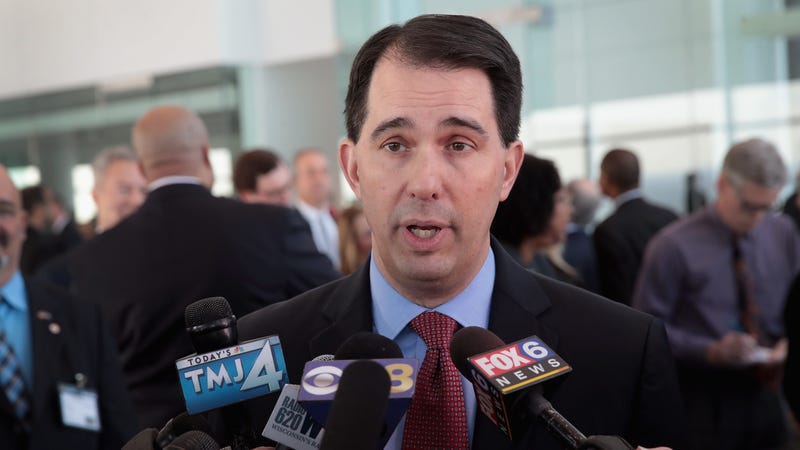 Wisconsin Governor Scott Walker speaks to the press at an event held to announce Foxconn’s plan to purchase an office building from Northwestern Mutual on February 6, 2018 in Milwaukee, Wisconsin.Photo: Getty
Wisconsin Governor Scott Walker speaks to the press at an event held to announce Foxconn’s plan to purchase an office building from Northwestern Mutual on February 6, 2018 in Milwaukee, Wisconsin.Photo: Getty
Foxconn, the giant Taiwanese electronics manufacturer that works with everyone from Apple to Amazon, now has a North American headquarters in Milwaukee, Wisconsin after purchasing a large office building in the city, according to the Associated Press.
The company is taking over a seven-story building previously owned by Northwestern Mutual, which is located about 30 miles from the company’s LCD manufacturing plant that is being built in the state. Foxconn’s headquarters will house about 500 workers and will “focus on building a stronger corporate team here in Milwaukee,” per company executive Louis Woo.
Foxconn’s decision to set up shop in Wisconsin is a score for the state only achieved by completing favor after favor in order to woo the manufacturing giant. Wisconsin Governor Scott Walker and the majority-Republican state legislature agreed in 2016 to provide Foxconn with a $3 billion package of tax breaks and incentives if the company would build a plant in the state.
The original deal included $1.5 billion in state income tax credits for job creation, another $1.35 billion for capital investment, and $150 million for sales and use tax exemptions—all in exchange for 3,000 jobs. (Foxconn has claimed it could bring as many as 13,000 to the factory, but the company announced a $4 billion investment in automation earlier this year and bragged about replacing 60,000 factory workers with robots in 2016. That will likely keep a cap on just how many people it actually employs.)
Governor Walker has happily played up the 13,000 figure but even if Foxconn managed to hit that high ceiling, Wisconsin would still be paying out a massive amount to create those jobs. Per CNN, the state will pay between $15,000 and $19,000 per job per year in incentives, assuming 13,000 positions are created—well above the standard cost of $2,400 per job per year, according to a report from the W.E. Upjohn Institute for Employment Research.
The state’s giveaways have only ballooned since the original agreement. A memo compiled by the nonpartisan Legislative Fiscal Bureau and released earlier this year showed projected public costs on the project totaled more than $4.5 billion when accounting for local government incentives, grants, and ancillary work meant to benefit the Foxconn’s plant.
Earlier this week, Governor Walker proposed spending a huge chunk of federal funding to finish a freeway project that runs near the Foxconn plant, effectively diverting those funds away from projects like restoring and rebuilding bridges and roads in rural parts of the state. Wisconsin’s Department of Natural Resources has also graciously granted Foxconn the right to siphon off seven million gallons of water per day from Lake Michigan, thanks to a very friendly reading of a proposal as being for public use despite most of the water diversion going to Foxconn’s plant.
Perhaps most troubling about Foxconn’s presence is the state’s willingness to help roll over its own citizens located near the company’s proposed factory site. Last month, Belt Magazine reported local authorities took steps to designate about 3,000 acres of agricultural land, farmhouses, and single-family homes as “blighted”—a move that could allow the government to seize homes with eminent domain. Reason recently highlighted some of the families who may lose their homes so that Foxconn can build its factory.
All of the state’s questionable practices are well in line with the reputation of the company it’s trying to court. Foxconn has come under fire for abhorrent labor practices over the years. Factory workers have been exposed to brutal working conditions akin to sweatshops that have driven some employees to suicide. The company has violated labor laws, used underaged workers, and overworked its employees. Now it has a home in Wisconsin.
[Associated Press, Reuters]